The Rising Need for Occupational Health Experts in Delhi
Delhi, the bustling capital of India, is home to countless industries—ranging from manufacturing units and IT firms to logistics and startups. With this massive industrial growth comes a pressing need for better workplace health management. Employees today face not only physical but also mental stressors due to long hours, pollution, and high workloads. As companies expand, ensuring employee health is no longer a luxury—it’s a necessity.
This is where AFIH (Associate Fellow of Industrial Health) doctors play a crucial role. They are trained experts who focus on occupational health and safety, ensuring that the workplace is a safe, healthy, and productive environment. The presence of an AFIH doctor can drastically reduce workplace hazards, manage occupational diseases, and improve overall productivity.
In Delhi’s fast-paced work environment, having an AFIH doctor onboard isn’t just about compliance—it’s about showing responsibility towards employees and long-term business sustainability. Let’s dive deep into why every company in Delhi must prioritize hiring an AFIH-certified doctor.
Understanding Who an AFIH Doctor Is

What Does AFIH Stand For?
AFIH stands for Associate Fellow of Industrial Health, a certification course offered by the Directorate General of Factory Advice Service and Labour Institutes (DGFASLI), Government of India. It is a prestigious qualification designed for medical professionals who wish to specialize in occupational health and safety.
The AFIH course equips doctors with knowledge about workplace hazards, occupational diseases, industrial hygiene, ergonomics, and preventive healthcare. This specialized training allows them to manage and mitigate health risks in industrial and corporate setups effectively.
Role of an AFIH Doctor in Workplace Health Management
An AFIH doctor serves as a bridge between employee health and business productivity. They are responsible for ensuring that workplace conditions meet health and safety standards while addressing any health concerns employees might face due to their job roles. From conducting pre-employment medical check-ups to managing medical emergencies, an AFIH doctor’s role is comprehensive and vital.
They don’t just treat employees—they prevent illness by identifying risk factors early. Whether it’s exposure to chemicals, ergonomic issues, or mental stress, these professionals ensure that every employee remains healthy and safe on the job.
Why Occupational Health Matters for Delhi-Based Companies
Increasing Industrialization and Workforce Size
Delhi’s industrial landscape is rapidly expanding. With a growing workforce across sectors like IT, construction, and manufacturing, the health risks associated with urban workspaces are also multiplying. Employees spend long hours in front of screens, work under stressful conditions, or deal with heavy machinery—all of which contribute to physical and mental health challenges.
Without proper occupational health management, companies risk losing productivity due to absenteeism, burnout, and medical emergencies. AFIH doctors act as the first line of defense against these challenges by implementing health surveillance systems and regular wellness programs.
Health Risks in Urban Work Environments
Delhi’s pollution levels, poor air quality, and high noise exposure make the situation even more serious. Employees working in offices or factories are often exposed to pollutants that lead to respiratory illnesses, fatigue, and other chronic health conditions. Occupational health programs led by AFIH doctors can help monitor these issues and introduce preventive actions such as health screenings, ergonomic interventions, and stress management initiatives.
When companies in Delhi take occupational health seriously, they not only improve employee satisfaction but also strengthen their reputation as responsible employers.
Legal and Regulatory Requirements for Occupational Health in India
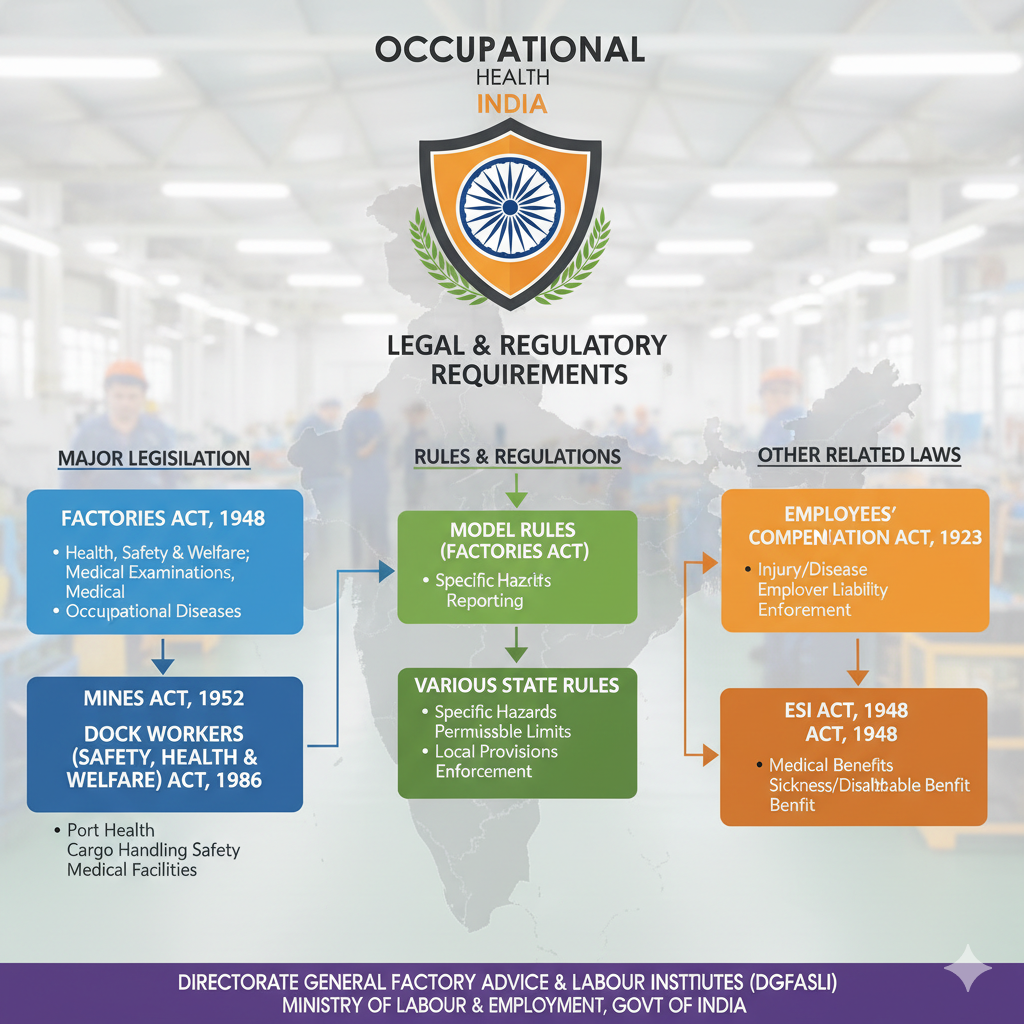
Government Guidelines for Workplace Health & Safety
The Indian government mandates strict adherence to workplace health and safety norms under the Factories Act, 1948, and related regulations. Employers must ensure that working conditions do not endanger employees’ physical or mental well-being.
Having an AFIH doctor onboard fulfills these obligations efficiently. They ensure compliance with safety laws, maintain medical records, and oversee the implementation of safety audits.
How AFIH Certification Aligns with Indian Labor Laws
AFIH-certified doctors understand the intricacies of occupational health laws. Their training equips them to interpret and apply these regulations within a company. For example, they can conduct periodic medical examinations as required by the Factories Act and help companies avoid legal penalties or shutdowns due to non-compliance.
Compliance with labor and health laws not only avoids fines but also builds a culture of safety and trust within the organization.
Key Responsibilities of an AFIH Doctor in a Company
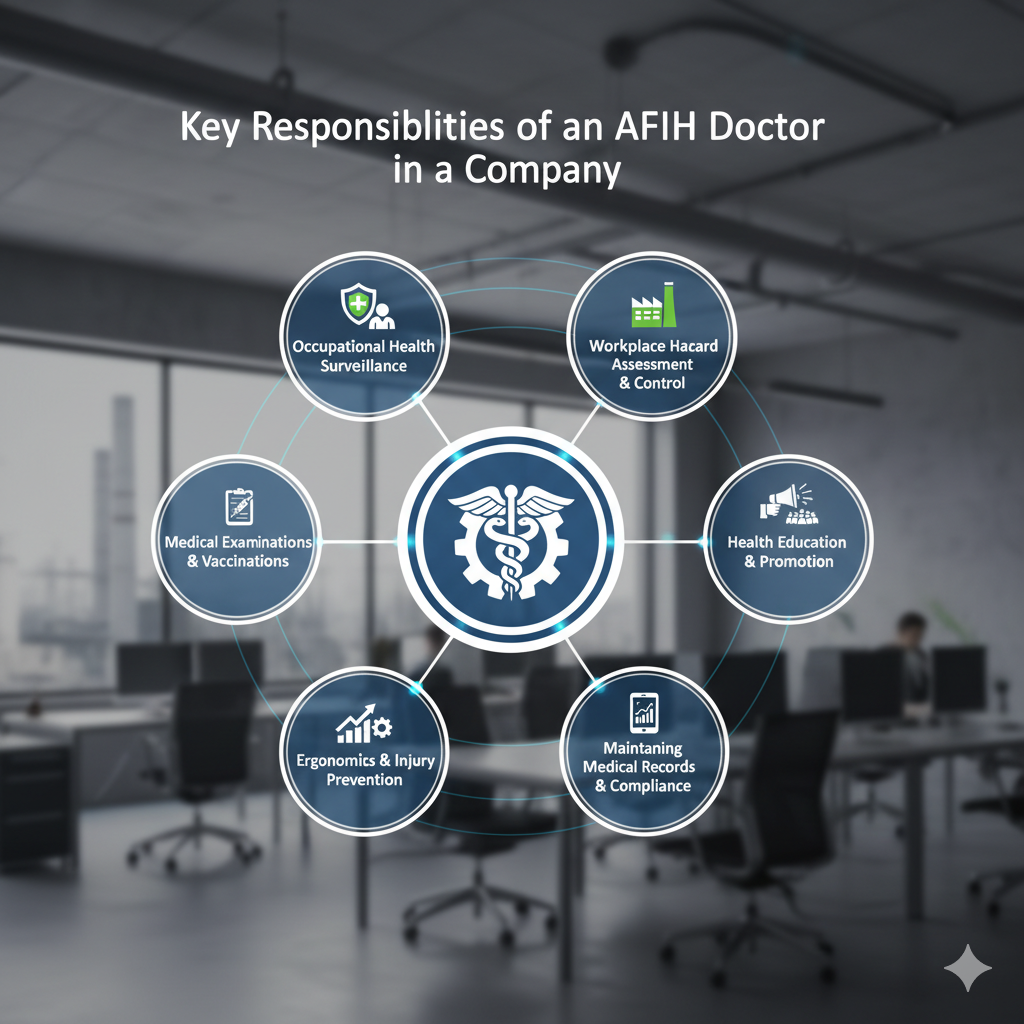
Conducting Medical Examinations and Risk Assessments
One of the primary responsibilities of an AFIH doctor is to perform thorough medical examinations—both before and during employment. Pre-employment checkups ensure that new hires are fit for their roles, while periodic health assessments help detect early signs of occupational illnesses. These evaluations are crucial in identifying issues like respiratory problems, skin conditions, or musculoskeletal disorders that could arise from specific job tasks.
In Delhi’s diverse industrial setting, employees are often exposed to chemical fumes, dust, heat, or repetitive strain. AFIH doctors assess these environmental conditions and recommend appropriate control measures such as improved ventilation, ergonomic tools, or protective gear. By doing so, they not only safeguard employee health but also help the company minimize compensation claims and potential legal issues.
Managing Workplace Health Emergencies
Another vital duty is emergency medical response. Industrial accidents, chemical exposures, and heat strokes are not uncommon in manufacturing or construction sectors in Delhi. An AFIH doctor is trained to provide immediate medical care in such scenarios and coordinate further treatment when necessary.
They also establish first-aid protocols, train staff in emergency response, and ensure that medical rooms are properly equipped. Having a qualified AFIH doctor means that in case of an emergency, employees receive timely and professional medical attention—potentially saving lives and preventing long-term health consequences.
Creating Health Awareness and Training Programs
Beyond clinical duties, AFIH doctors focus on education. They organize health awareness workshops, vaccination drives, and training sessions to promote hygiene, ergonomics, and mental wellness. These programs cultivate a culture of safety and accountability, where employees become proactive about their own well-being.
This holistic approach ensures that health is not just a department but an integral part of the company’s DNA.
AFIH Doctors and Their Role in Preventing Occupational Diseases
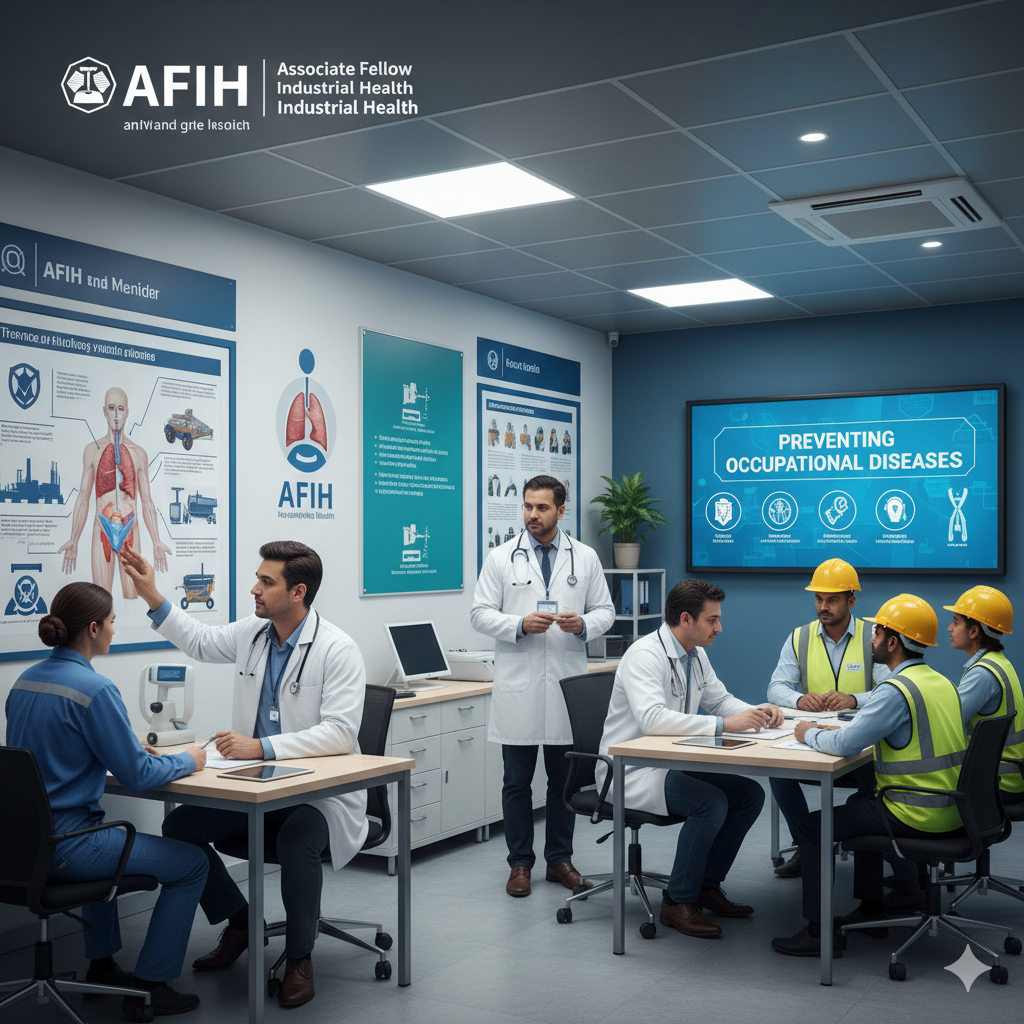
Identifying Work-Related Illnesses Early
Prevention always begins with early detection. AFIH doctors are experts in recognizing the subtle signs of occupational diseases that might go unnoticed by general practitioners. For example, repetitive strain injuries, occupational asthma, or chemical dermatitis often develop gradually. By conducting regular screenings and maintaining detailed health records, AFIH doctors can identify potential problems before they escalate.
In Delhi, where many employees work in environments with high pollution or limited ventilation, early diagnosis can significantly reduce long-term health complications. These doctors also collaborate with management to modify work processes or introduce safer practices, reducing risks for everyone.
Implementing Preventive Healthcare Plans
An AFIH doctor’s work doesn’t stop at diagnosis. They design customized preventive healthcare programs that suit the specific risks of each industry—whether it’s chemical exposure in manufacturing, eye strain in IT offices, or posture-related issues in logistics.
Preventive measures may include routine medical checkups, improved ventilation systems, ergonomic furniture, and wellness programs focusing on exercise and nutrition. When companies invest in prevention under the guidance of an AFIH doctor, they reduce absenteeism, increase employee satisfaction, and save significantly on healthcare expenses.
Importance of AFIH Doctors in Reducing Absenteeism and Improving Productivity

Health Monitoring and Employee Retention
Healthy employees are productive employees—it’s as simple as that. AFIH doctors monitor employee health metrics and provide continuous medical supervision, ensuring that minor health issues don’t turn into chronic conditions that lead to long absences. Regular counseling sessions and lifestyle modification programs can also help reduce fatigue and burnout.
When employees feel that their organization genuinely cares about their health, they are more likely to stay loyal and motivated. In today’s competitive job market in Delhi, employee retention is crucial. An AFIH doctor’s involvement in workplace health not only reduces absenteeism but also strengthens the company’s reputation as a responsible and employee-centric employer.
Impact on Overall Business Growth
Companies that prioritize occupational health enjoy measurable benefits. Reduced sick leaves, lower insurance costs, and increased morale directly boost productivity. A workforce that feels physically and mentally fit performs better, leading to greater efficiency and profitability.
Moreover, an AFIH doctor’s presence reassures clients, investors, and stakeholders that the company operates ethically and responsibly. This enhances brand image and positions the business as a preferred partner in the corporate ecosystem.
AFIH Doctors and Workplace Safety in Manufacturing Units
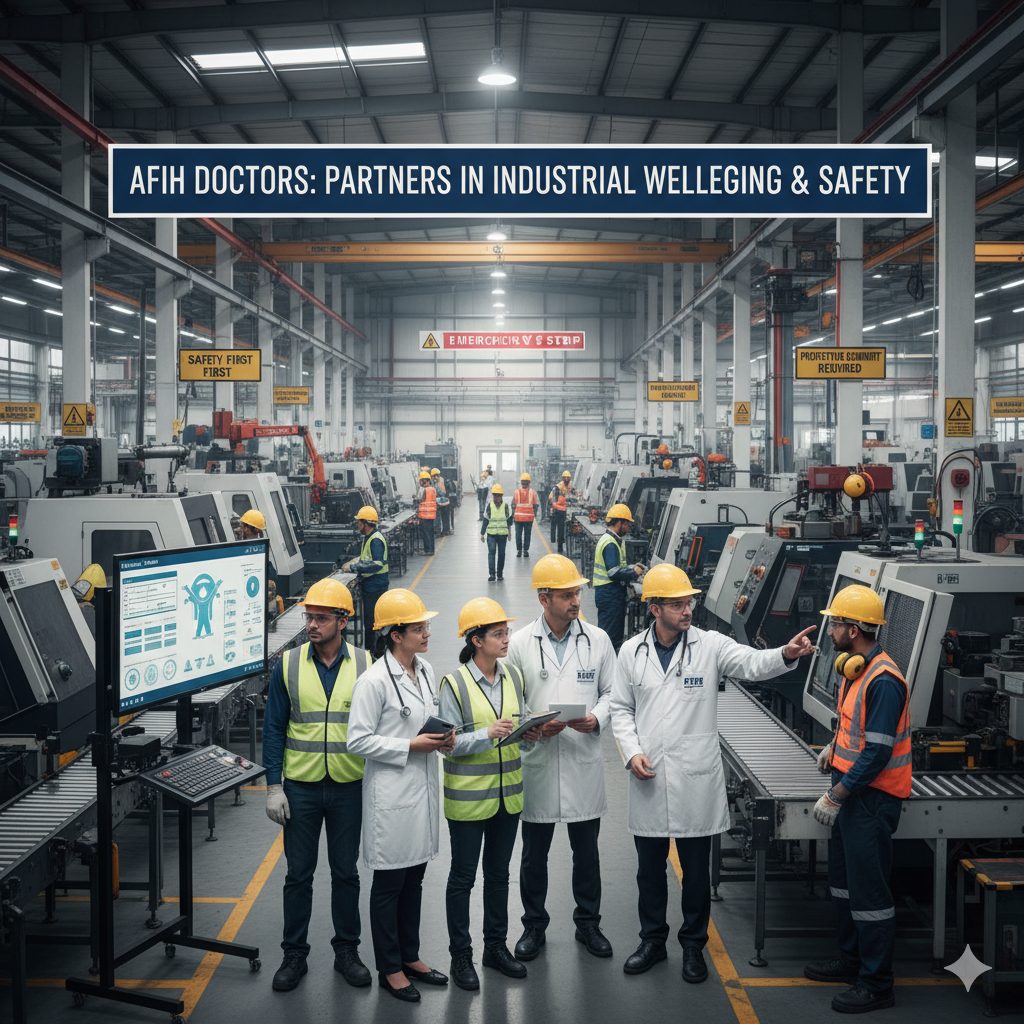
Risk Analysis and Hazard Management
Manufacturing industries often involve heavy machinery, chemicals, heat, and noise—all potential hazards. AFIH doctors conduct comprehensive risk assessments to evaluate these dangers and recommend safety protocols. They identify workplace hazards through inspections, employee feedback, and data analysis, helping management take corrective actions before accidents occur.
For example, in Delhi’s industrial zones, where workers handle solvents or operate machinery, AFIH doctors may recommend using protective equipment, improving ventilation, or scheduling regular rest breaks. These simple yet effective interventions can drastically reduce the occurrence of workplace injuries and illnesses.
Safety Protocols for Industrial Workers
Besides identifying risks, AFIH doctors are instrumental in developing Standard Operating Procedures (SOPs) for health and safety. They design training sessions for workers to ensure they understand proper safety practices, from handling equipment to emergency evacuation.
In industries where exposure to noise or chemicals is high, the doctor might introduce audiometric testing or respiratory health surveillance. These preventive actions safeguard not only the employees but also the company from potential lawsuits or downtime caused by accidents.
In essence, AFIH doctors serve as a company’s in-house guardian angel—protecting lives while optimizing operations.
The Growing Demand for AFIH Doctors in Delhi’s Corporate Sector

Changing Corporate Culture Towards Employee Wellness
The modern corporate world in Delhi is increasingly recognizing that employee well-being equals company success. Health and wellness programs are no longer optional benefits—they are key components of workplace strategy.
AFIH doctors play a pivotal role in this transformation. They help design wellness programs, health checkup camps, and ergonomic workplace layouts. They also monitor air quality, lighting, and temperature control, ensuring that employees work in optimal conditions.
This focus on well-being fosters stronger teams, better morale, and higher retention rates. The shift from reactive to proactive healthcare is perhaps the biggest reason for the surge in demand for AFIH-certified doctors across Delhi’s corporate offices.
Trends in Occupational Health Hiring
With the increase in occupational hazards and corporate wellness awareness, more organizations are now recruiting in-house or consulting AFIH doctors. Some companies even collaborate with external occupational health service providers to ensure compliance and employee safety.
This trend signifies a broader realization that healthy workplaces attract top talent, improve productivity, and comply with government mandates—creating a win-win situation for both employers and employees.
Why Startups and SMEs in Delhi Should Consider Hiring AFIH Doctors

Cost-Effective Health Management
Many small and medium enterprises (SMEs) or startups in Delhi often assume that hiring an AFIH doctor is an expense only large corporations can afford. However, this perception couldn’t be further from the truth. In reality, AFIH doctors can help reduce long-term operational costs by minimizing employee absenteeism, workplace accidents, and turnover rates.
Instead of reacting to medical emergencies or health issues, startups can take a preventive approach guided by an AFIH professional. The doctor can implement health checkups, design wellness programs, and ensure compliance with occupational health laws—all of which prevent costly legal and productivity losses.
Startups thrive on energy and innovation, but burnout, poor ergonomics, and stress can quickly derail progress. Having a part-time or consultant AFIH doctor ensures that the workforce stays healthy, engaged, and performing at its peak.
Building a Responsible Brand Image
Delhi’s modern workforce is more health-conscious than ever. Employees want to work for organizations that care about their well-being. Startups and SMEs that hire AFIH doctors demonstrate their commitment to employee safety and ethical business practices.
This not only helps attract top talent but also builds trust with clients, investors, and regulators. In a competitive market, such initiatives can make a business stand out and project a strong, socially responsible brand identity. In essence, an AFIH doctor becomes a symbol of care, credibility, and corporate integrity.
The Economic Benefits of Having an AFIH Doctor On Board

Lower Healthcare Costs
When employees are healthy, companies save significantly on healthcare claims and insurance costs. AFIH doctors specialize in early detection and prevention of work-related illnesses, reducing the need for costly treatments later.
Regular health screenings, vaccination drives, and ergonomic improvements all contribute to long-term financial savings. Moreover, AFIH doctors ensure compliance with occupational health norms, helping businesses avoid heavy fines or legal liabilities.
In Delhi, where healthcare expenses can be substantial, having an AFIH doctor is like having an insurance policy that keeps both employees and finances protected.
Enhanced Productivity and Morale
Healthy employees work smarter, not harder. AFIH doctors play a crucial role in boosting morale by addressing health issues that affect job performance—be it eye strain from long screen hours or respiratory problems from pollution exposure.
When employees feel cared for, they show higher engagement and dedication to their roles. The company benefits through increased efficiency, lower turnover rates, and improved overall performance.
The presence of an AFIH doctor thus contributes directly to economic growth by maintaining a balanced, healthy, and productive workforce.
How AFIH Doctors Contribute to Employee Mental Health

Stress Management Programs
Mental health has become a major concern in Delhi’s fast-paced corporate environment. Long commutes, workload pressure, and lack of work-life balance contribute to rising cases of anxiety, depression, and burnout. AFIH doctors, with their understanding of occupational psychology, design effective stress management and wellness programs to address these issues.
They organize counseling sessions, relaxation workshops, and mental health awareness campaigns. By encouraging open conversations about mental well-being, they help reduce the stigma surrounding psychological issues in the workplace.
Promoting Work-Life Balance
An AFIH doctor’s contribution extends beyond just treating stress—they promote holistic well-being. They collaborate with HR departments to design flexible schedules, recreational activities, and employee assistance programs.
In a city like Delhi, where the pace of life rarely slows down, such initiatives help employees recharge and maintain a healthy balance between work and personal life. A mentally healthy workforce is more creative, focused, and resilient—qualities that drive business success in the long term.
Training and Skills Required for an AFIH Doctor
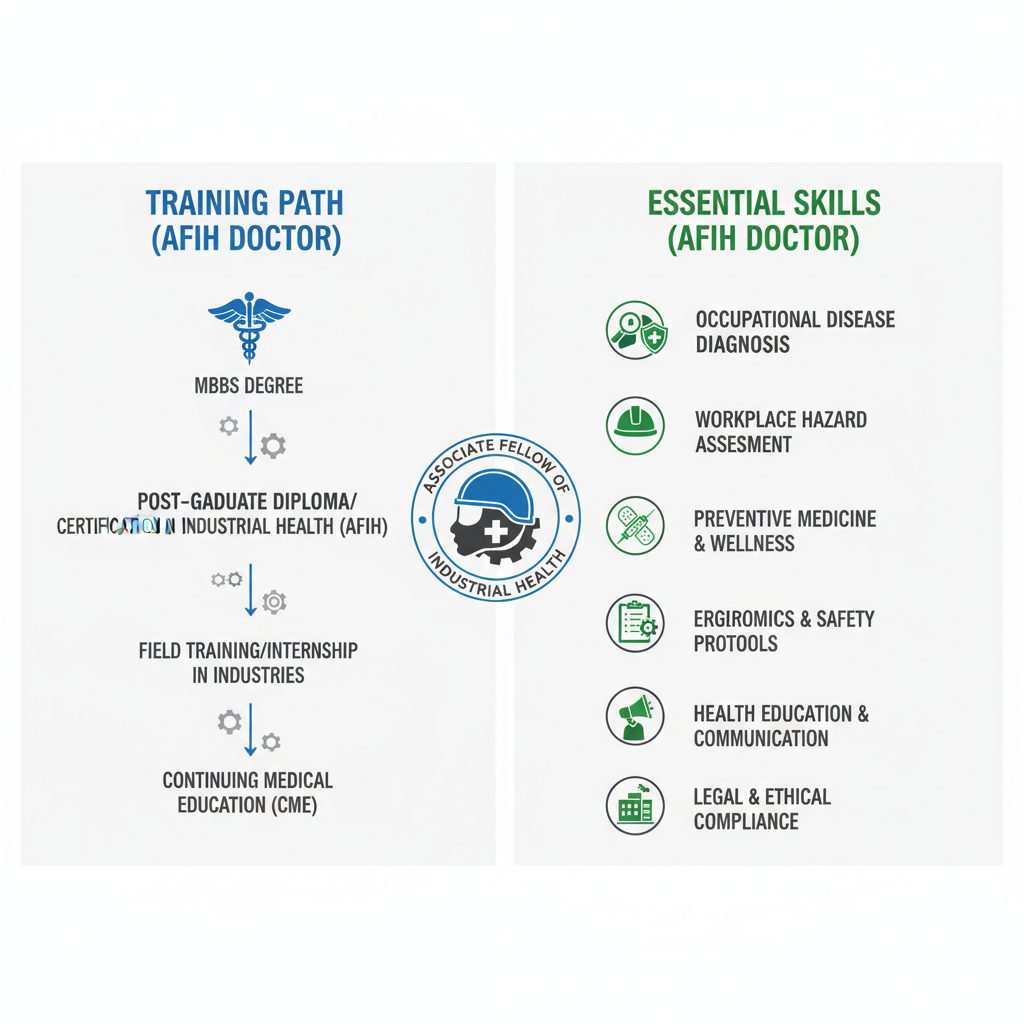
Curriculum and Certification Overview
To become an AFIH doctor, a medical graduate must undergo specialized training accredited by DGFASLI. The course typically covers subjects like industrial hygiene, toxicology, ergonomics, environmental safety, and occupational medicine.
This intensive training equips doctors to assess workplace risks, manage industrial health hazards, and develop preventive strategies. The AFIH certification is recognized nationwide, making these professionals highly valuable across industries—from manufacturing and logistics to IT and healthcare.
Essential Qualities of a Competent AFIH Professional
A great AFIH doctor is not just knowledgeable but also empathetic and observant. They must possess strong communication skills to interact effectively with both management and employees. Analytical thinking, quick decision-making, and a proactive attitude are also crucial qualities.
Their work requires balancing medical expertise with strategic thinking—ensuring employee welfare without disrupting business operations. This unique skill set makes AFIH doctors indispensable in maintaining workplace harmony and productivity.
Integrating AFIH Doctors into Corporate Health Policies
Setting Up Health Departments or Medical Rooms
To fully benefit from an AFIH doctor’s expertise, companies should integrate them into their corporate health framework. Setting up an on-site medical room or occupational health department ensures that employees have access to immediate care and preventive programs.
These facilities become centers for conducting health screenings, fitness tests, and counseling sessions. In addition, AFIH doctors can maintain digital health records and use analytics to track overall workforce wellness trends.
Collaboration with HR and Safety Teams
An AFIH doctor’s role is most effective when they collaborate closely with the HR and safety departments. Together, they can design policies on workplace hygiene, mental health support, ergonomics, and safety audits.
This collaboration ensures that employee well-being is woven into every aspect of company culture. Whether it’s planning shift schedules, addressing grievances, or improving work environments, the AFIH doctor becomes a strategic advisor in shaping a healthier, more productive workforce.
Future of Occupational Health in Delhi: The Road Ahead
Technological Advancements and Health Monitoring
The future of occupational health in Delhi looks promising, especially with technology entering the scene. AFIH doctors are now leveraging AI-based health monitoring systems, wearable devices, and digital wellness platforms to track employee health in real-time.
Such innovations allow early detection of issues like fatigue, posture problems, or exposure risks. They also enable data-driven decision-making, helping companies optimize their wellness strategies. As Delhi becomes a hub for smart industries, AFIH doctors will play an even more strategic role in integrating technology with health management.
The Evolving Role of AFIH Doctors in Modern Workspaces
Tomorrow’s workplaces will not only focus on productivity but also on sustainability, safety, and human-centric design. AFIH doctors will evolve from being medical advisors to becoming full-fledged corporate wellness strategists.
Their expertise will be essential for aligning health goals with business objectives, promoting green work environments, and adapting to remote or hybrid work challenges. As companies continue to prioritize people over processes, AFIH doctors will remain at the core of this transformation.
A Healthier Workforce is a Stronger Company
In today’s dynamic and competitive business world, health and productivity go hand in hand. For companies in Delhi—whether large corporations or small startups—having an AFIH doctor on board is not just a compliance measure; it’s a smart investment in long-term success.
These specialized professionals ensure compliance with occupational health laws, enhance workplace safety, reduce absenteeism, and promote mental well-being. More importantly, they create a work culture where employees feel valued, cared for, and motivated.
A healthy workforce is a company’s greatest asset. By bringing an AFIH doctor on board, organizations in Delhi take a vital step toward building sustainable growth, ethical leadership, and a thriving business ecosystem.
FAQs
- What does an AFIH doctor do in a company?
An AFIH doctor manages occupational health and safety, conducts medical checkups, prevents workplace illnesses, and ensures compliance with health regulations. - Is hiring an AFIH doctor mandatory for all companies in Delhi?
While mandatory for certain industries under the Factories Act, it’s increasingly recommended for all companies to enhance employee health and meet compliance standards. - How can small businesses afford an AFIH doctor?
SMEs and startups can hire AFIH doctors on a consultancy basis, making it a cost-effective solution for preventive health management. - Can an AFIH doctor help improve mental health at work?
Yes, AFIH doctors organize stress management programs, counseling sessions, and awareness workshops to promote emotional and psychological well-being. - What qualifications are required to become an AFIH doctor?
A candidate must hold an MBBS degree and complete the AFIH certification course approved by DGFASLI to practice as an occupational health specialist.

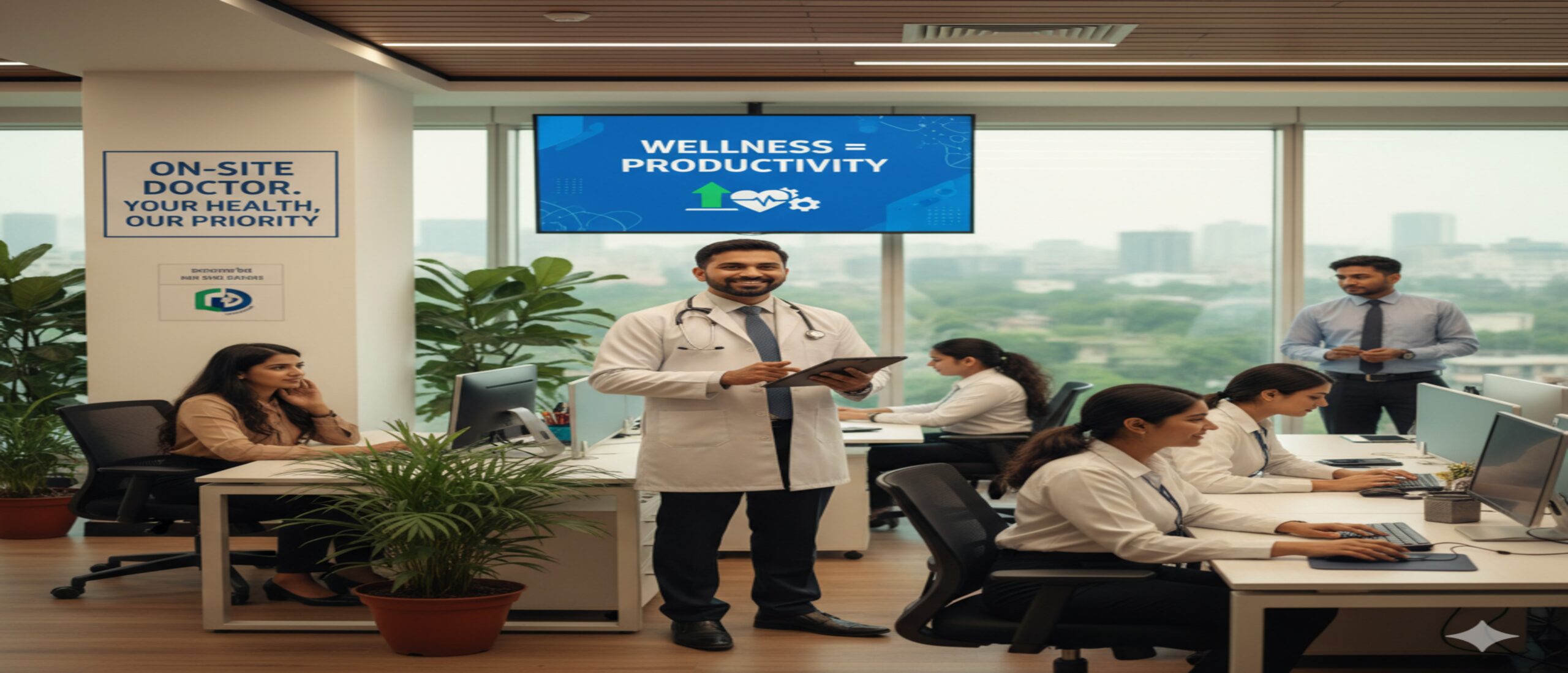
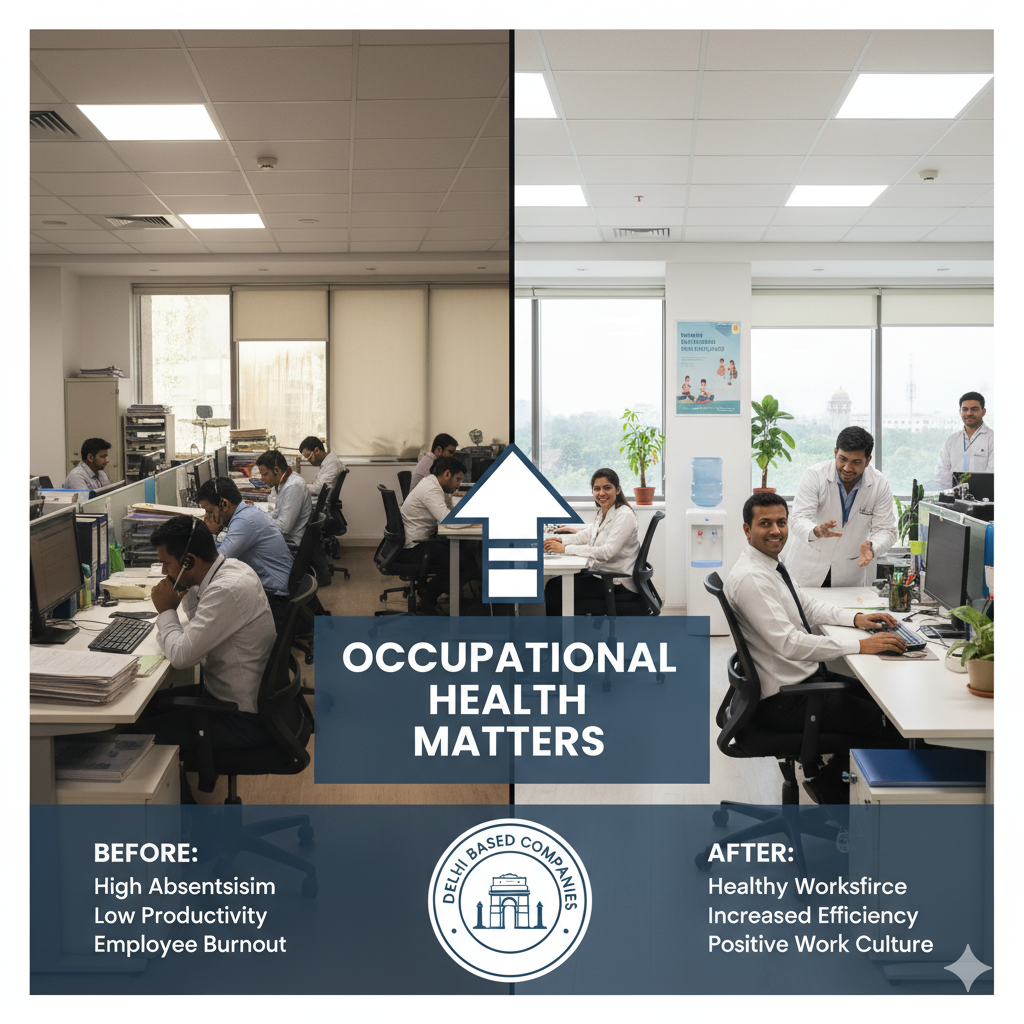
Leave a Reply